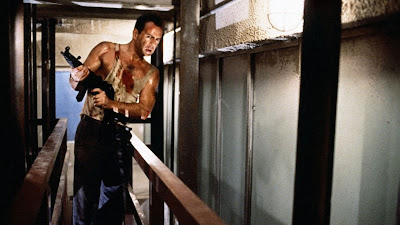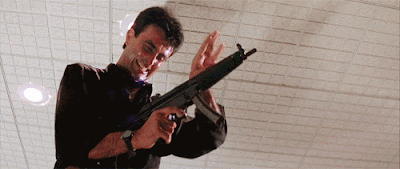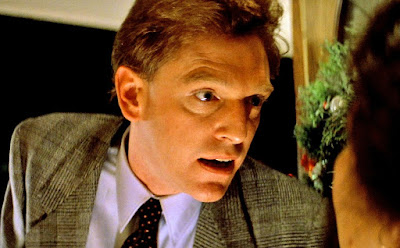Thirty years ago today, screen legend Robert De Niro lightened up, and gave us his second best '80s role(behind "Raging Bull"). That might not sound like a big deal to millennials more familiar with his work opposite Ben Stiller in the "Fockers" trilogy than say, "Taxi Driver" and "The Deer Hunter", but this was a welcome change of pace from packing on fifty pounds for a few scenes for America's favorite actor. That's right, De Niro was a god back then, and his gruff ex-cop-turned-bounty hunter Jack Walsh was my first brush with his brand of greatness as an appreciative eight year old.
"Midnight Run" is one of those endlessly enjoyable movies that make you fall in love with movies, and it's reputation has grown from a modest summer hit to one of this era's essential viewing experiences. So, you've never even heard of Martin Brest and Charles Grodin? Don't know what Fistophobia is?? You've come to the right place. Put that cigarette out, and join me for a rollicking recap of a new classic.
Jack Walsh is tired of tracking down Los Angeles lowlifes. He nearly gets his head blown off trying to do it in the first minute(I love it when a movie cuts right to the chase). Danny Elfman's bouncy score is one of the best sounds I've ever heard from the future "Batman" composer, and immediately sets the tone for total elation. Walsh's black leather jacket should be in the Smithsonian next to Indiana Jones' outerwear. When a character's wardrobe, however limited, is firmly established, the audience gets a strong sense of who he is.
Joe Pantoliano has a problem. A former mob accountant skipped town with millions after the perpetually-frazzled Eddie Moscone posted $450,000 bail for him. His livelihood depends on getting Jonathan 'The Duke' Mardukas from NY to LA in five days- a "midnight run" in bail bondsmen lingo. Walsh wants $100,000, which should be enough to get out of this dirty, rotten business forever. We underestimate the importance of good character actors like Joey Pants who should be instantly recognizable for his roles in "Risky Business", "The Goonies", "The Fugitive" and "The Matrix". He brings a distinct energy to all of his scenes.
Walsh does some detective work and quickly learns that the Duke is in demand. The mob will pay more than that putz bail bondsman. Here he meets Yaphet Kotto of "Alien" fame, as humorless FBI agent Alonzo Mosley. Jack is unimpressed and unintimidated by his government adversary, but would love a pair of those sunglasses.
 |
| And his identification. |
Jack finds the Duke living in New York City with his wife, and the audience is struck by how passive and non-threatening he is, making Walsh's trademark aggression seem totally unwarranted. The studio wanted the more-bankable Robin Williams for the role. They even pushed for CHER at one point("Moonstruck" was a big hit). Director Martin Brest fought for the underrated comedic gifts of Charles Grodin, and I'd like to thank him for it. Grodin worked in Hollywood for about 25 years, and if you haven't seen 1972's "The Heartbreak Kid", I strongly advise you to do so(forget the '07 Farrelly bros. remake). He abruptly quit acting to become a political commentator in the mid-'90s, back when that was a less inflammatory line of work. In recent years, he's returned to his roots(2016's "The Comedian" offers a brief "Midnight Run" reunion).
You can't take a prisoner aboard an airplane if he doesn't want to fly. Jack doesn't know that. Grodin's preflight freak-out confirmed that he was the right man to play the politely devious Duke, around the twenty-five minute mark. Walsh's tight schedule gets torn up by his fussy target, as he now faces a MUCH longer trip. Like "Planes, Trains and Automobiles"(another late '80s classic, released the previous year), we have two guys that wouldn't spend ten seconds in each-other's company, if not for a highly irregular set of circumstances.
The Duke loves to travel by train, if only he wasn't handcuffed to a tiny bathroom. Jack finds out that his coffee shop fantasy is a pipe dream(and that he's a lousy tipper) during a late night on the rails. His eating habits aren't that great, either. George Gallo's screenplay organically fleshes out the differences between the two men, and his pages of dialogue sound as natural as can be in the hands of these old pros.
Meet Marvin Dorfler, Jack's ornery rival. When Walsh starts fucking things up(Eddie's words), this burly bozo is usually called in for backup. Marvin makes Jack look like an amiable chatterbox by comparison, and his attempts to upend our hero makes for an amusing subplot. John Ashton is best known as Sgt. Taggart in the first two "Beverly Hills Cop" movies, and should have had more opportunities in the big leagues.
Don't you love pay phones? Cell phones are wonderfully convenient in real life, but a little too convenient for the fictional lives of film characters. If Jack was free to call or text anytime, anywhere, then we wouldn't have a movie(or at least a much less interesting one). I doubt he could afford one of those bricks that Gordon Gekko was gabbing on. My movie would be set in the 20th Century, before those mobile distractions took over the world.
"Why weren't you popular with the Chicago police department?" Jack would rather not discuss his past, on the longest bus ride of his life. De Niro may not be the king of comedy, but his obvious annoyance over the Duke's subtle-yet-honest antagonism is hilarious. Smokers, just remember one thing- there's people all around you, that are trying to live healthy lives.
We have "Midnight Run" to thank for memorializing the ferocious Dennis Farina. Jimmy Serrano is the Vegas mob heavy that wants the Duke six feet down in the dirt. He also ran Jack out of Chicago when he was running things there(for reasons that are slowly revealed). I love how nearly everything that comes out of his mouth is a threat of some sort, frequently directed at incompetent disciples. Philip Baker Hall is his calm right hand whose advice probably should have been taken more often. Farina fell in love with acting(and the movie biz in general) after being hired as Michael Mann's technical adviser for 1981's "Thief". Previously, he was a Chicago cop for fifteen years. Incredible.
Mafia assassins are waiting to whack the Duke at a bus stop, until Alonzo and the local authorities intervene. They try it anyway, and the ensuing gunfight allows John and Jack to escape in a stolen FBI car(Mosley loses his badge AND his transportation). This is a good time to mention that Martin Brest made the two best action-comedies EVER, and the other one was 1984's "Beverly Hills Cop".
Jack is forced to stop by the Chicago suburbs to ask the ex-wife he hasn't seen in nine years for enough cash to continue the journey in this heartbreaking scene. His 13 year old daughter got so big(that'll happen in a decade). The audience instantly realizes how much Walsh has lost over the years, and just how lonely his life has been. The awkwardness of the impromptu reunion couldn't be more real, as Jack has no idea what to say. He has no right to take that babysitting money. His ex mercifully offers some of hers, along with the use of a Station Wagon she doesn't need. Watch for how Walsh fixes John's coat before they get in it, an oh-so-subtle/blink-and-you'll-miss indicator of a growing respect between them.
I'm certain that this film wouldn't have the surprising depth it has, if not for De Niro and Grodin finding moments that wouldn't otherwise be there, in an environment created by Brest's perfectionism. Most movies today can't be bothered with such quiet character-building exchanges, and these two maximize the potential of every one. Jack ran away from a corrupt police force, and John never knew he was working for the mob. He's not a criminal. That changes things, even if Jack is reluctant to admit it.
Marvin rescues John and Jack from Serrano's goons(so much for a relaxing breakfast of Chorizo and eggs). There's more hired killers in a helicopter, as if the put-upon pair needed another obstacle. The action spills into a nearby river where John is faced with a big choice- will he save Jack or himself?
"Midnight Run" was filmed in California, New York, Illinois, Arizona and Nevada. Brest moved the production to New Zealand for this watery ride because the Salt River was way too cold. You'd be hard-pressed to find another movie with this many varied settings. It may not have made for an easy or fun four-month shoot, but film is forever, and Brest recognized the importance of capturing the flavor of these locations to really drive home the length and the scope of this cross-country trek.
Now, Jack is really agitated. He's hungry, he's dirty, and the Duke ISN'T afraid to fly after all(who lied to who first?). With no money and no transportation(Walsh resorts to his second of three car thefts), John has a brilliant idea to get the duo fed and back on track.

Red's bar has a counterfeit bill problem, in a very funny scene that puts Grodin's dry delivery at center-stage. What follows is a mad dash for a freight train for more male bonding(after some more fierce bickering, of course). Jack's watch story is another example of how this film mixes humor and heart with extraordinary ease. Too many of today's offerings can't even get one half of that equation right.
You may be unaware that Martin Brest has been on a self-imposed exile from the entertainment industry since the epic failure of 2003's "Gigli". A talented, tenured filmmaker got caught in the crossfire that was the Bennifer backlash. His unwillingness to try again has always perplexed me. This man knew what Hollywood success felt like. Perhaps, Brest, and his badly bruised ego, just tired of the whole fickle beast("Meet Joe Black" bombed, too). He's a reclusive, enigmatic figure that has never publicly spoken about his huge highs and lows. We could probably learn a thing or two from his unique perspective. For knowledgeable film fans, his sudden retirement is damn-near tragic.
John gets picked up by a persistent Marvin and Jack ends up in FBI custody, at the conclusion of another wild chase. Dorfler didn't come all this way to not get paid, and it won't be a lousy twenty-five grand(Eddie offered him considerably less than Jack for the job). Instead, the Duke will be in the mob's hands before nightfall, as we're hurtled toward the suspenseful conclusion.
Jimmy Serrano comes face-to-face with his slippery former employee in the back of a limo. He wants to let the Duke know personally that he will die tonight. His wife will, too. Farina is scary here. It annoys me when modern comedies serve up soft villainy. The bad guys don't know they're in a comedy. There should always be menace when your main antagonist is onscreen.
Jack has a deal to make with Alonzo- forget about all that FBI impersonating I've been doing the last few days and let's nail Serrano together. He's the REAL bad guy. Walsh has enough dirt to force an airport meeting, knowing that his old enemy won't want to leave any loose ends. Those computer discs could easily contain enough information to put Serrano and all of his associates away for a long time, and kidnapping the Duke should make it a life sentence. Get this man a wire.
It may have taken ten years, but Jack finally gets the cuffs slapped on the man that ruined his life. He gets to feel like a cop again. This FBI ambush mirrored real-life events, for it wouldn't be long before organized crime(of the Italian variety) was completely dismantled by crafty Feds that decided these designer-suit-wearing psychopaths had been doing whatever the hell they wanted for long enough. The rise of technology was the worst thing that ever happened to these soon-to-be rats that abandoned their so-called code of silence, the moment a permanent stay in prison became a strong possibility. John Gotti was wearing an orange jumpsuit before Bill Clinton became President, and his equally immoral pals disappeared by the end of the decade. So, enjoy your annual viewing of "Goodfellas" and "The Sopranos", but let's be glad that these miscreants only exist on film and television in the 21st Century.
It would have been a nice coffee shop. Jack lets the Duke go, and if you can think of a finale between two heterosexual men as touching as this farewell, please let me know. "The Shawshank Redemption"? Probably a toss-up. Charlie and Raymond Babbitt saw each other again in two weeks. Jack and John might meet up again in the next life. Walsh would have made his deadline, which is good enough for him. The ever-enterprising Mardukas shows his appreciation with a $300,000 money belt he had been hiding the whole time. It's not a payoff, it's a gift, that will allow Jack to move into a very respectable neighborhood. Maybe he got himself a new watch.
"Looks like I'm walking". One of the best last lines ever in a movie. I'd follow Jack Walsh on another adventure right now, but it looks like he's retired. An improbable sequel has occasionally been rumored, as recently as six years ago. I'm guessing the script never came out right. I had no idea what a bounty hunter was until De Niro entered my life, and I'll watch "Midnight Run" a million more times before I'll ever watch a reality show about it. This movie is two hours and six minutes of pure pleasure. There isn't a moment where I wasn't engaged or entertained. De Niro, Grodin and Brest captured lightning in a bottle with a simple, flawlessly-executed formula. Go watch "The Bounty Hunter" and "Hot Pursuit" if you don't believe me. Great movies are like a perfect storm. "Midnight Run" is one of the world's greatest films.























































































